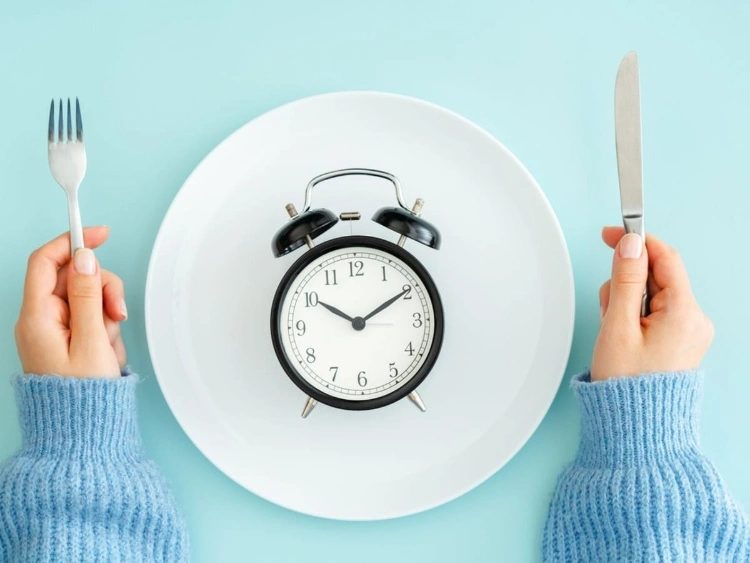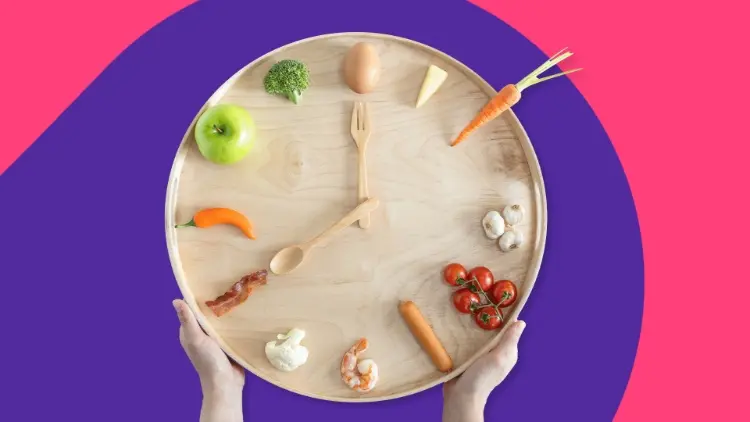Eating and drinking too little, exercising too intensively… I know you actually mean well and want to lose weight as quickly as possible. But dieting fails you again and again. Doesn’t it? There are several common mistakes with intermittent fasting that make life difficult for ladies over 50. Losing weight is particularly hard during the menopausal years. Let us explain the mistakes that cause your diet to fail and how you can avoid them!
Common mistakes with intermittent fasting: How to lose weight over 50?

Intermittent fasting is a diet plan that is becoming increasingly popular. It is recommended again and again to women in menopause. And numerous celebrities such as Jennifer Aniston and Halle Berry also live by it.
The basic principles of the diet are very simple: you are allowed to eat whatever you want during certain periods of the day and completely abstain from food during other periods. The advantages are clear: the diet is simple, you don’t have to count calories, and you can eat what your heart desires.
Nevertheless, many people make the next common mistakes, which have a negative impact on the end result. Even young people can hardly lose weight this way, and after 50, losing weight doesn’t work at all. Sometimes you even put on a few kilos/pounds, and then you have to struggle with it.
Common misconceptions about losing weight in old age: Long fasting periods

Sometimes the body simply needs time to detoxify. So every now and then, longer fasting periods of 24 or 48 hours make sense. However, if you are following an Intermittent Fasting diet plan, you should avoid these longer periods of fasting. For example, if you ate something every two hours before starting the diet and then suddenly eat nothing for 24 hours, the body will be enormously stressed. The result—you have no energy and you feel sick.
The common mistakes of not adjusting the diet to your daily schedule

You get up early in the morning, eat breakfast and are very active during the day, but then go to bed early? A fasting time from 5pm to 9am is then suitable. But if you are more nocturnal, then you should adjust the fasting time accordingly to your sleep-wake rhythm.
According to studies, you eat 15 % less food if you eat as usual during intermittent fasting. This is because the active phase, the time when you are allowed to eat, is shorter than usual. This means that you skip a meal or snack and your daily calorie intake is reduced accordingly. For this to succeed, however, it is very important that you sleep during most of the fasting period. Otherwise, you will feel hungry and eat more than usual at the end of the fasting.
Keeping an unhealthy diet as common mistakes with intermittent fasting
Another piece of cake, fast food in the afternoon or chocolate to get you through the night: If you eat unhealthily and consume more calories every day, you will never feel the benefits of Intermittent Fasting. Healthy eating is very important, especially with this diet plan. Plus, this diet can help you get rid of adipocytes for good!
Intermittent fasting can help shed those excess kilos/pounds. But only sports and exercises will keep you fit as you age. So it is very important to keep active.
Common mistakes with losing weight over 50: Eating too little

If you are still trying to eat significantly less than usual at 50, you are risking your health. Eating less than 1200 calories a day only has negative consequences for adults: Muscle mass decreases and metabolism slows down. These are two negative side effects that people have to deal with in old age anyway.
To this point, there is another common mistake that people are rarely aware of. If you underestimate the fasting period and eat too little right before it, you encourage the rejection of the ghrelin hormone. It signals to the body that you are hungry. But ghrelin fulfils another critical function: it inhibits fat burning and promotes the storage of fat cells. As a result, you will always feel tired, constantly hungry and may even gain weight. So it is better to eat before the break.
Also read: Healthy Eating After 60: What to Eat & What to Avoid?
The common mistakes with intermittent fasting: Drinking high-calorie drinks

If you add milk or sugar to your coffee or tea, you have practically broken your fast. Everyone knows this by now. But unfortunately, there are other drinks that people mistakenly think are low in calories. For example, coconut water. Because of this, the effect of the diet plan is not achieved. As it is precisely the breaks that make people eat less and, accordingly, reduce their daily calorie intake. To avoid the mistake, beginners should drink only water during the breaks in the first month. If you take longer breaks between meals, you can add a pinch of salt to the drinking water.
A common misunderstanding about losing weight during menopause

At the beginning of fasting, water is released as the body breaks down glycogen. The longer you fast, the less fat reserves your body has, and the less water is released. So you should drink extra water during fasting.
And if you are wondering if intermittent fasting affects your hormones, we have an article on that topic as well!
Also read: The 4-1-1 Workout Method: Fitness Excellence for Everyone
